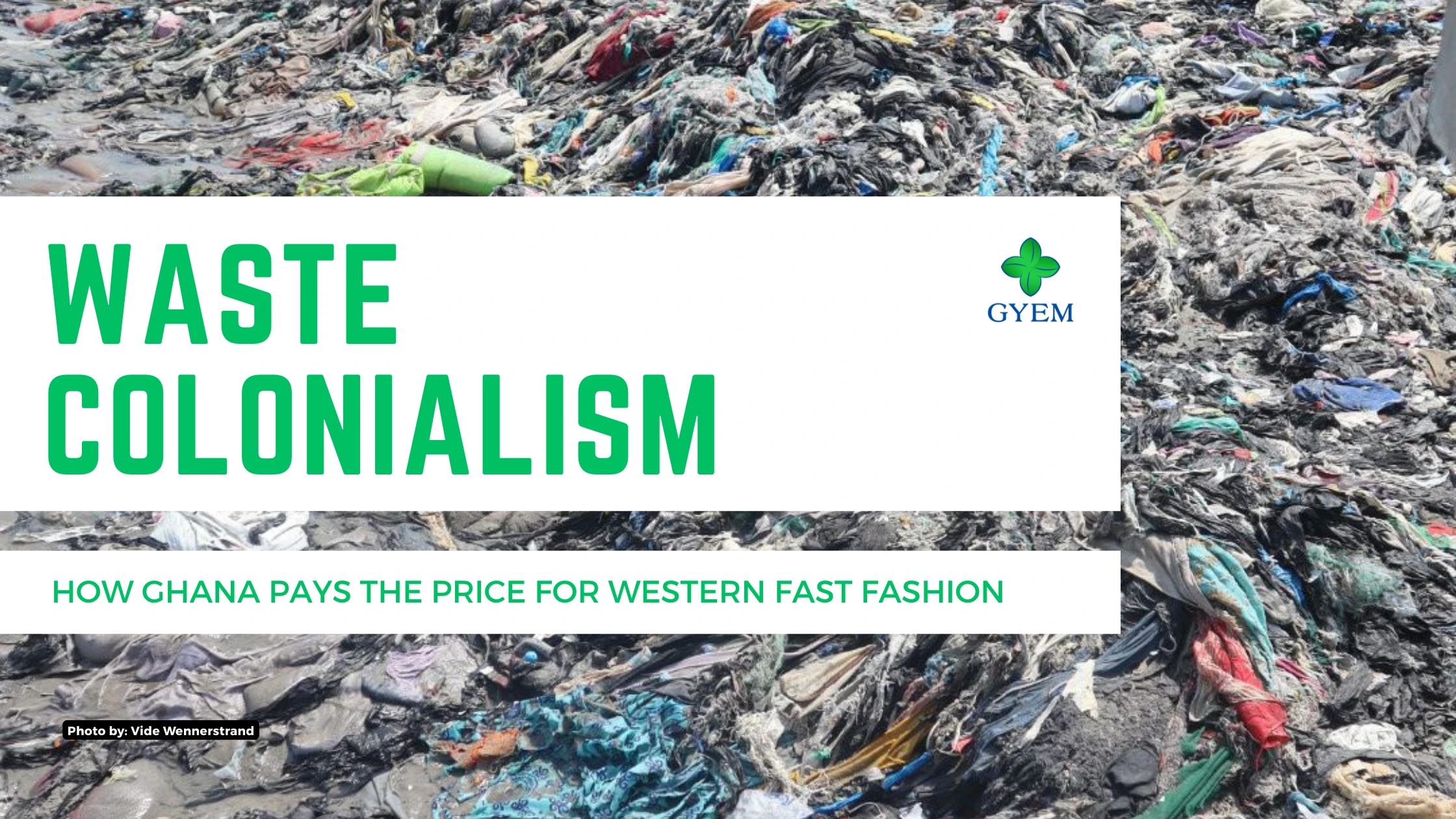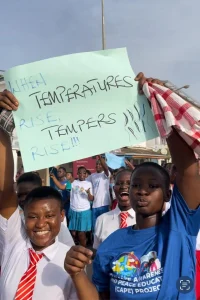As the world marked International Day of Zero Waste 2025 with its focus on sustainable fashion, Ghana continues to bear the burnt of the textile waste crisis by Western countries. This is not a story about recycling – it’s about systemic exploitation.
The Kantamanto Crisis
Every week, 15 million items of second-hand clothing arrive at Accra’s Kantamanto Market, the largest second-hand clothing hub in West Africa. But there’s a dirty secret: 40% of these imports – 6 million items weekly – are immediately discarded as waste. These aren’t quality garments finding new life; they’re the unusable dregs of fast fashion’s overproduction crisis.
Recent research by Wennerstrand (2024) reveals how retailers gamble their livelihoods on these shipments. “Every bale is a risk,” explains Wennerstrand, whose research exposed the market’s realities. “A so-called ‘Grade A’ shipment might contain 50% unusable items – bloodstained, torn, or synthetic fabrics unsuitable for Ghana’s climate.”
The January 2025 fire at Kantamanto Market was more than a tragedy – it was a stark revelation. As flames consumed over 7,000 shops and left 30,000 traders destitute, the world saw the human cost of waste colonialism in horrifying detail.
“The fire spread like wildfire through piles of synthetic clothing,” described Samuel Amoah, Chairman of the Kantamanto Traders Association. “These weren’t just shops burning – they were lifetimes of investment going up in toxic smoke.”
The disaster exposed four critical facts:
- Overconsumption & Overproduction: Present-day Western exporters of used clothes have one thing in common: an increase in unnecessary consumption habits. The declining real prices of available goods drive this trend. The desire for fast, disposable fashion, along with the easy access to cheap products, is influenced by capital mobility, particularly foreign direct investment in countries like India, Pakistan, and China, and the reduction of global labor costs. These reductions are often achieved by cutting wages and overlooking environmental costs, which leads to overproduction and overconsumption (Wennerstrand, 2024).
- Lack of Consequences: This overproduction and overconsumption within the fast fashion paradigm are complemented by the notion and practice of clothing disposability. Western countries are not directly impacted by the negative consequences of their overproduction and overconsumption because Africa accepts their waste. This paradigm will persist as long as Western exporters do not experience the adverse effects of their actions, like the fire outbreak in Kantamanto.
- Fall of Import Substitution: In the post-independence period, West African countries implemented an import substitution industrialization strategy, which included controlling cotton prices and imposing tariffs on imported textiles. This approach successfully fostered the development of domestic industries, leading to the establishment of 41 textile companies by the early 1980s. By 2004, only six companies were operating at full capacity in West Africa, and only three of these with satisfactory levels of performance (Baden & Barber, 2005, p. 14). In Clothing Poverty, Andrew Brooks examines the trade networks that involve retailers and charities, revealing their complex roles in perpetuating poverty (Ethicalgear, 2025).
- Land grabbing: The use of land in West Africa for disposing of tons of used clothing was a well-considered strategy that fueled the fast fashion industry. With a domestic clothing industry that was already weak and outperformed by the economic liberalization enforced through the Structural Adjustment Programs administered by the IMF and World Bank, West African countries have thus become a major marketplace for second-hand clothing imports to this day. The global second-hand clothing trade supports ongoing production and consumption while simultaneously evading the environmental and financial responsibilities associated with waste management.
From Charity to Colonialism
The myth of charitable clothing donations has long obscured a brutal economic reality:
- 70% of the UK’s “donated” clothes get exported to sovereign countries, with Ghana receiving the most.
- Fast fashion brands design clothes with planned obsolescence, knowing the waste will be shipped abroad
- Ghana’s local textile industry has been decimated by this influx, creating dependency
“Waste colonialism isn’t accidental – it’s a system. The Global North’s overconsumption requires the Global South to become its dumping ground,” Wennerstrand notes.
Environmental Toll
The consequences are devastating:
1. Ecological Disaster
- Textile waste chokes Accra’s waterways, with microplastics now found in fish stocks and breast milk
- The Korle Lagoon, once a thriving ecosystem, is now a textile graveyard
2. Economic Exploitation
- Kantamanto retailers sink into debt buying unpredictable bales
- Kayayei (head porters), mostly young women, carry 55kg bales for pennies, risking permanent injury
3. Health Crisis
- Burning synthetic fabrics releases toxic chemicals into informal settlements
- Water pollution drives up rates of cholera and respiratory diseases
The Way Forward
As the UN calls for “circular solutions,” Ghana must demand more than band-aid fixes:
1. Policy Action
- Strengthen and enforce import bans on non-reusable textiles
- Implement Extended Producer Responsibility (EPR) laws holding brands accountable
2. Economic Justice
- Invest in local textile production and upcycling initiatives
- Create alternative livelihoods for those trapped in the waste economy
3. Cultural Reclamation
- Revive traditional fabrics like kente and adinkra suited to local climates
- Reject the narrative that “donations” equal development
A Question of Sovereignty
The 2025 Zero Waste Day theme challenges us to rethink fashion. For Ghana, this isn’t about better recycling – it’s about ending a colonial relationship that treats African land as expendable.
As Wennerstrand’s research concludes: “Until the Global North takes responsibility for its waste, no amount of ‘sustainable fashion’ initiatives will address the fundamental injustice.”
The time has come to stop accepting exploitation disguised as charity. Ghana’s environmental future depends on it.
This article was informed by fieldwork and research conducted at Kantamanto Market by Vide Wennerstrand during his internship with the Ghana Youth Environmental Movement in 2024 for his thesis “Kantamanto: The Ground Zero of Waste Colonialism.”
#StopWasteColonialism #ZeroWasteDay #GhanaFirst
Written by: Blaise Oghenefegor Bethel
References
Adu-Owusu, P. (2025, January 3). Kantamanto Market fire: One dead, over 30,000 traders affected, 7,000 shops destroyed – MyJoyOnline. MyJoyOnline. https://www.myjoyonline.com/kantamanto-market-fire-one-dead-over-30000-traders-affected-7000-shops-destroyed/
Ethicalgear. (2025). The problems with unwanted clothes! Ethicalgear.com. https://ethicalgear.com/environment/unwanted_clothes
Kaledzi, I. (2022, January 6). Ghana: Used Clothes Choke Both Markets and Environment In Ghana. AllAfrica.com. https://allafrica.com/stories/202201060138.html
Sally, B., & Catherine, B. (2005, September). The Impact of the Second-hand Clothing Trade on Developing Countries. Oxfam Policy & Practice. https://policy-practice.oxfam.org/resources/the-impact-of-the-second-hand-clothing-trade-on-developing-countries-112464/
UNEP. (2025). International Day of Zero Waste 2025. UNEP – UN Environment Programme. https://www.unep.org/events/un-day/international-day-zero-waste-2025
Wennerstrand, V. (2024). Bachelor Thesis Vide Wennerstrand.pdf. Google Docs. https://drive.google.com/file/d/1Xffhn0mSrBZ3YrvlAluPPw8h7qRuLYjz/view?usp=sharing




